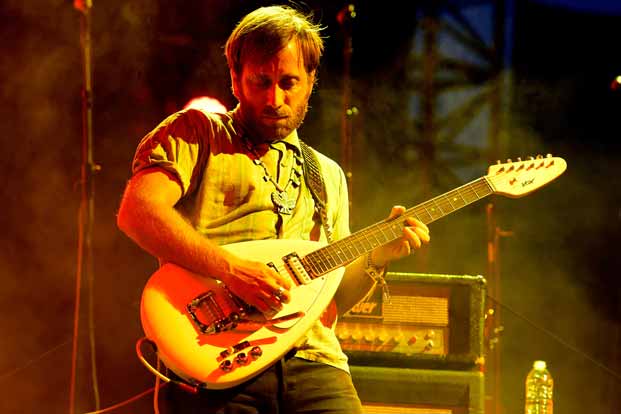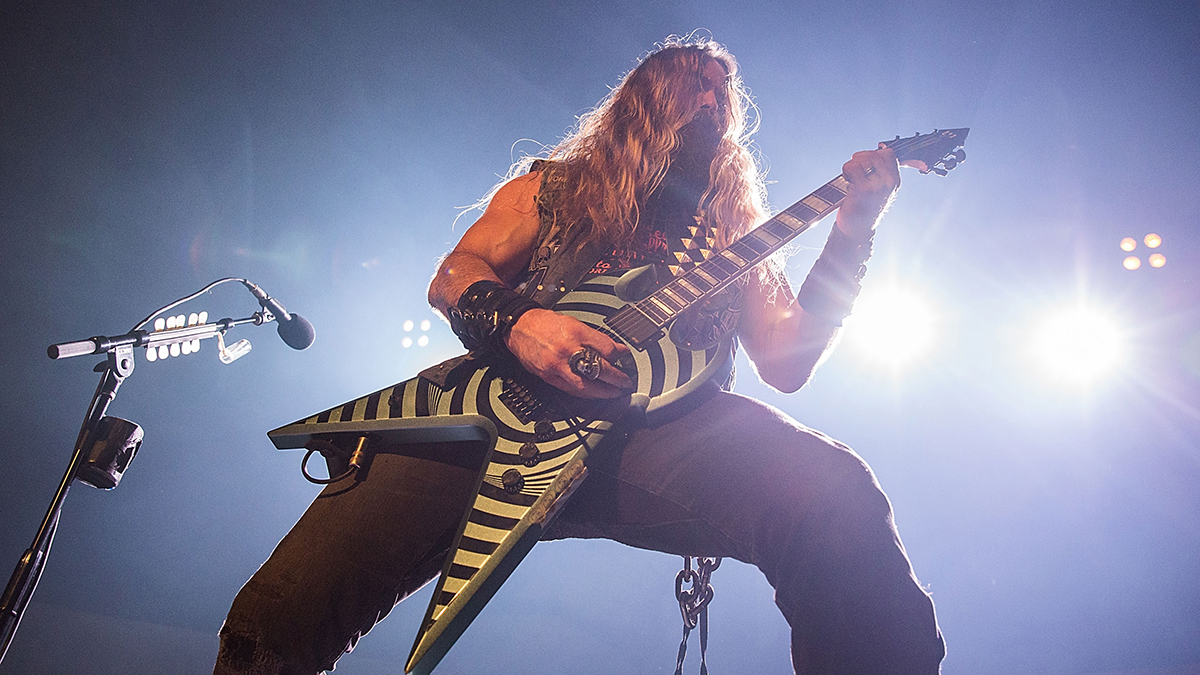Dan Auerbach Is Having Fun Building His Own Personal Empire in Nashville
All the latest guitar news, interviews, lessons, reviews, deals and more, direct to your inbox!
You are now subscribed
Your newsletter sign-up was successful

“The reason I first wanted to play guitar is because my family played bluegrass,” Dan Auerbach says.
“There were a lot of guitars around and they would sing and play these old songs. And a lot of those songs were recorded in Nashville. So, growing up, Nashville was a place I knew I needed to go.”
True to his word, Auerbach is telling Guitar World this story while on the phone from Nashville, which is where the Ohio native calls home these days. It’s also the city where he set up his recording studio, Easy Eye Sound, where he has over the past few years produced albums from artists as varied as Dr. John to the Pretenders to Cage the Elephant.
Additionally, Auerbach’s own band, the Black Keys, have tracked all or parts of their last two efforts at the facility. More recently, Easy Eye became the meeting place for some of Nashville’s finest musicians, who gathered there to assist Auerbach in the recording of his new solo album, Waiting on a Song. The 10-track effort is an overall lighter and more expansive affair than his Black Keys work, with songs that evidence a strong affinity for Fifties and Sixties rock and roll and that are outfitted with all manner of strings, horns and acoustic picking and strumming.
Auerbach’s second solo record (his first, Keep It Hid, was released back in 2009), Waiting on a Song features a who’s-who of Nashville players, from guitarist and pedal-steel extraordinaire Russ Pahl to keyboardist Bobby Wood and drummer Gene Chrisman, both former members of the “Memphis Boys,” the famed American Sound Studios house band. Among the hundreds of artists Wood and Chrisman have played with over the decades is renowned country-folk singer-songwriter John Prine, who, coincidentally, also co-wrote the title track to Waiting on a Song alongside Auerbach.
“I met some amazing people and kept ’em busy,” Auerbach says. “Tried to get ’em in the studio as much as I possibly could. We wrote and recorded about 60 or 70 songs, and the 10 on the album were a bunch of tunes that we thought worked well together from that group.” Among the other “amazing people” that assisted Auerbach on Waiting on a Song were two six-string icons—twang guitar legend Duane Eddy and former Dire Straits leader Mark Knopfler.
As far as how Eddy, whose 1959 guitar version of the “Peter Gunn” theme stands as a monumental moment in electric guitar playing, got involved in the project, Auerbach explains, “I met Duane through my buddy David Ferguson, who executive produced my record. Fergie kind of introduced me to everyone in Nashville, really. And he said to me, ‘C’mon, Auerbach, we’re gonna go have a burger with Duane Eddy!’ He picked me up and we went over to this place that only had buffalo burgers. Apparently, that’s what Duane likes. I hate ’em.” Auerbach laughs. “But I had to pretend like I liked ’em because Duane Eddy likes ’em.”
All the latest guitar news, interviews, lessons, reviews, deals and more, direct to your inbox!
Not long after, Auerbach had Eddy over to Easy Eye. “I realized he’s a studio junkie, just like me,” Auerbach says. “That’s why he has that cool sound. Because he loved experimenting in the studio. He and [producer] Lee Hazlewood found a guitar sound really early on, and that became the Duane Eddy sound.” That “Duane Eddy sound” is unmistakable on Waiting on a Song, in particular in the reverb-drenched, twangy lines Eddy plays on the rockabilly rave-up “Livin’ in Sin.”
“There’s very few people in the guitar world where you can say they take the instrument, which is a commonly played instrument, and they make it sound only like one person,” Auerbach says of Eddy. “That’s really hard to do. But Duane’s done that.” It’s safe to say that another guitarist who has done that in his career is Mark Knopfler, whose distinctive six-string work spices up the jaunty Waiting on a Song track “Shine on Me.”
Knopfler’s participation, however, came about in a different manner than Eddy’s. “I was listening to the playback of ‘Shine on Me’ right after we recorded it and I just said out loud, ‘Man, this sounds like Mark Knopfler should be on this song,” Auerbach recalls. “And I’d never met Mark Knopfler. But I had my manager reach out to him and just kind of ask him nicely if he would consider it. We sent him the song, and two days later he sent it back with his guitar on it and it was just like I heard it in my head. It was perfect. And he doesn’t even play a solo—it’s just the most perfect rhythm guitar. It fits right in with the band.”
As far as Auerbach’s own performances on the songs, in addition to singing, he says, “I played all kinds of stuff. I played drums. I played percussion. I played a bunch of keyboard parts. I arranged strings. I was just kinda doing whatever was needed. If that meant playing a solid rhythm acoustic part, that’s what I would do. It was all about serving the song.”
Since the Black Keys wrapped touring in support of their most recent album, 2014’s Turn Blue, Auerbach, who is enjoying his first extended stretch of time off the road in many years, has become somewhat consumed with serving the song.
“I’ve sort of gotten into this routine where I come to the studio every day at about nine o’clock in the morning and I just start working,” he says. “When I’m writing and recording every day, I feel like the blade just gets sharper, you know? Your writing is best when you do it every single day and keep that muscle going. And I feel like my studio is a big part of making that possible. Everything just seems to flow better.”
When it comes to Easy Eye, Auerbach says he envisions the facility functioning in a manner similar to legendary label/studios like Motown and Stax.
“Absolutely,” he says. “I have a house band. All my instruments are here. I have a whole crew of writers I’ve been writing with. It’s very much sort of like a factory, but in the best sense of the word. I started a record label, Easy Eye Sound Records, and we’re gonna start releasing albums. We’re just starting to sign some people, we’re putting the finishing touches on different records we cut here. Some with the same band from my record and some with other bands that already exist. It’s a big mix of stuff that I’m interested in.”
Auerbach has become so entrenched in Easy Eye, in fact, that when it comes to the music on Waiting on a Song, he says, “It feels weird talking about these songs because they’re so old to me right now. I cut ’em, and some of ’em, that was the last time I played ’em. And now I’m talking about ’em. But it’s not like that’s the end of it for me. We started making music last summer, and I’ve been writing and recording and making songs ever since. I’ve never really stopped, to be honest.”
• GUITARS Sixties Carvin, Sixties Fender Telecaster, mid-Sixties Gibson Trini Lopez, Guild Classical, Gibson Country Western, Kent hollowbody, Kent Bonanza 12-string, Gibson Everly Brothers Flattop
• AMPS 1963 Fender Vibroverb, 1965 Fender Blackface Princeton, 1968 Fender “Drip Edge” Deluxe Silverface
Rich is the co-author of the best-selling Nöthin' But a Good Time: The Uncensored History of the '80s Hard Rock Explosion. He is also a recording and performing musician, and a former editor of Guitar World magazine and executive editor of Guitar Aficionado magazine. He has authored several additional books, among them Kurt Cobain: Montage of Heck, the companion to the documentary of the same name.

